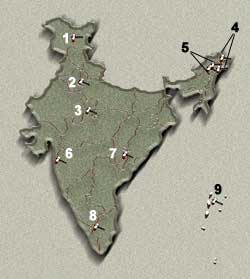Forest Flashpoints
 1: Jammu & Kashmir (J&K)
1: Jammu & Kashmir (J&K)
Allows felling in accordance with the J&K Forest Conservation Act, 1990
2: Delhi
200 wagons of illegal timber seized at Nangloi. Court asks for action against officials responsible
3: Madhya Pradesh
The court's investigating team finds illegal mining activity inside reserved forests in Shivpuri district, despite the ban
4: Arunachal Pradesh
Bans all wood-based industries in Tirap and Changlang districts
5: Assam
Orders all sawmills to close in Dibrugarh and Tinsukia
6: Maharashtra
Court bans felling in Matheran hill station
7: Chattisgarh
Calls for action against former commissioner of Bastar and other officials involved in illegal felling
8: Tamil Nadu
The original case. Stays felling and transportation of timber in Nilgiris
9: Andaman & Nicobar Islands
Sends a one-member committee to assess the impact of felling
Contrary to popular belief that the court has imposed a blanket ban for all states, regulations were specifically issued to certain states, taking into consideration the conditions prevailing in the region.
The Supreme Court order is widely criticised for being as blind to local needs. The fact is the court, despite its nationwide blanket ban on felling, addressed different regions' problems and also suggested the way out. The guiding principle is to check deforestation immediately. Social forestry and plantations have been spared, like in the case of Tamil Nadu. Similarly, in Jammu and Kashmir (J&K), honouring its autonomous character, felling has been allowed in accordance with the J&K Forest Conservation Act, 1990.
In Matheran, a hill station in Maharashtra, the apex court ordered a total ban following a petition on the threat to the ecosystem. The court also ordered the formation of an empowered committee in Madhya Pradesh and Chattisgarh to look into pending applications and future applications under the approval of the advocate general. "This is a significant step as it decentralises power to the local bodies. Other states must follow suit," says a lawyer who represents one of the Northeast in the Supreme Court.
